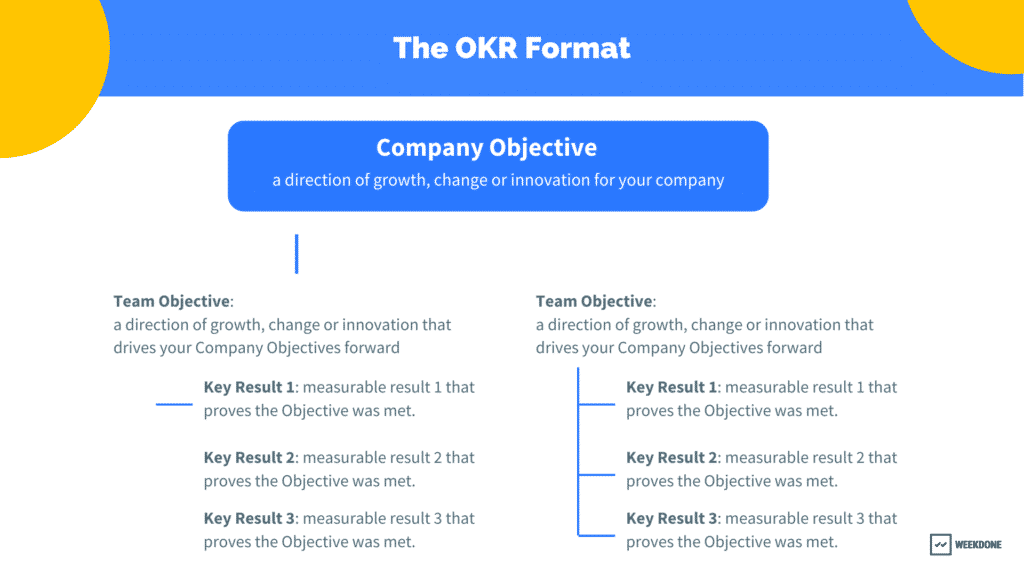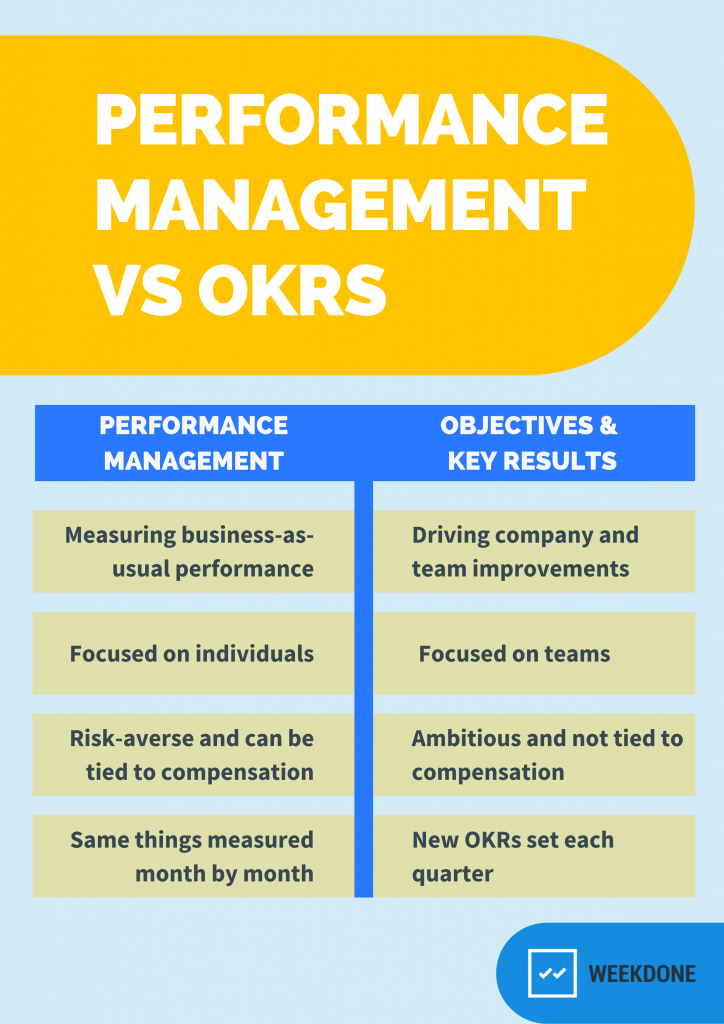When implementing OKRs (Objective and Key Results) goal-setting process, make sure that the progress on OKRs does not influence financial compensation or employees’ performance assessment. Otherwise, you’ll be missing the OKR benefits you expect to see.
Separating OKRs and performance management might sound counter-intuitive. However, if you think about it, you probably decided to implement OKRs because your current goal-setting process is not as effective as you would like it to be, not engaging for the employees, or is simply not enough.
Why is that?
What is the difference between OKRs and performance management? How can companies transform their internal goal-setting process with OKRs?
Try OKR Software 🎯
Set and track OKRs in dedicated software with built-in examples, guided OKR wizard, color-coded tracking, and visual dashboards. Stay focused – achieve goals.
Read on and you’ll learn everything you need to know about OKRs and performance management.
What are OKRs?
Objectives and Key Results (OKRs) is a popular goal management framework that brings company improvement areas to focus. From company strategy, create aligned quarterly Objectives to be executed by teams weekly and tracked by measurable outcomes.
I will (Objective) as measured by (Key Results)
John Doerr’s OKR Formula
OKRs have become one of the best ways for companies to organize teams, giving them clear-cut focus and providing an action plan to achieve goals. OKRs are usually set on a quarterly basis, when Company sets its Objective and lets teams come up with their OKRs.

What is Performance Management?
Performance management, on the other hand, is focused on how employees perform and if they meet the expectations set for their position. These performance evaluations take place annually and are termed annual performance reviews.
When implementing OKRs, 9 out of 10 companies are looking to improve clarity or alignment of priorities in their organization. OKRs can help people understand how their work moves the company forward. When teams take ownership of the company’s success, the company has a much brighter future. Ownership mentality is a big deal.
If that is really the purpose, then surely what matters is the observable impact that the teams can produce on business results, and not the mere % completion of their OKRs.
The point of implementing OKRs is to create an improvement-focused goal-setting process that involves more people in strategic conversations. This means that all teams will be more connected to the bigger picture and constantly thinking about their role in moving the entire company forward. Clearly, this type of thinking requires more imaginative risk-taking, more improvement-focused discussions, and definitely more cross-functional collaboration.
OKRs vs Performance Management: What’s the Difference?
In a nutshell, the processes that are put in place for writing OKRs and tracking progress on an ongoing basis are exactly what makes OKRs so powerful. And if you spend time implementing those processes but then tell people that their bonuses will depend on how well they are doing on their OKRs, you would defeat the purpose of OKRs and fail to reap the benefits of the methodology.

Now let’s look closer at the differences between OKRs and performance management.
1. OKRs are for exploring new opportunities
OKR best practices require openness and cross-functional communication. Goals expressed as OKRs should be ambitious, and that means exploring opportunities and trying things that have never been done before. Obviously, you cannot expect better business results if you don’t change what you do and how you do it.
With that in mind, connecting the percent of completion of OKRs to individual performance evaluation would result in sandbagging, less innovative thinking, and ultimately worse business results.
If you think about it, how can a team strive for excellence without exploring the unknown? And how can one explore the unknown with a constant fear of not meeting their performance targets?
Try OKR Software 🎯
Set and track OKRs in dedicated software with built-in examples, guided OKR wizard, color-coded tracking, and visual dashboards. Stay focused – achieve goals.
2. Teams have OKRs, individuals have tasks
If you want to see greater collaboration and have your teams truly invested in their work, you should never demand people to write personal OKRs.
Personal OKRs do not work well for organizational goal-setting because they divide the team into individual contributors who are preoccupied with completing day-to-day tasks as opposed to driving valuable business outcomes as a team.
Simply put, one person cannot do what a team can do, so personal OKRs are distractions that slow down the team. However, personal OKRs might be quite useful for writing goals focused on an individual’s professional growth and personal life improvements but that has no immediate or direct impact on the company’s success so it is quite different from organizational OKRs.
3. Focus on outcomes helps to prioritize activities
OKRs are not for organizing business-as-usual job responsibilities and expecting things to magically change. It’s a forward-looking goal-setting method that fuels teamwork and accountability.
The process of writing team OKRs will require the team members to come together and think about improvements they should be working on together. Based on the outcomes that the team members agree to work towards, each individual would have plans or tasks to complete. Prioritizing activities is much easier when you know what these activities are supposed to achieve.
4. Performance reviews might be a waste of time
Performance reviews are stressful for both managers and employees, so these ceremonies are often skipped or done superficially. And since they are usually organized 1:1, people tend to focus on task completion and there is no consideration for the bigger picture. This is simply not enough if you would like to improve and grow your business.
Some companies have ditched personal performance reviews completely because they have learned how to get the teams to focus on the outcomes that the organization needs to achieve. When those outcomes are specific enough, clear enough, and motivating enough, teams make better decisions when it comes to prioritizing Objectives and managing their time.
Try OKR Software 🎯
Set and track OKRs in dedicated software with built-in examples, guided OKR wizard, color-coded tracking, and visual dashboards. Stay focused – achieve goals.
Should OKRs be tied to compensation?
When teams are evaluated based on the % of their OKR completion, they inevitably end up scaring themselves back into the comfort zone, taking no risks, and going after the same old tactics that they have tried and tried over the years. And, ultimately, the company fails to embrace the power of the OKR methodology.
Weekdone is the best way for SMBs to implement OKRs.
📊 The visual OKR dashboards quickly show you how your company is doing.
💡Our OKR coaches will make sure your OKR transition is a success.
Is OKR a performance management tool?
The OKR goal-setting process is not suitable for performance management, and you shouldn’t think that you can somehow adjust the methodology to serve this purpose.
Instead, you should learn how to leverage your teams’ collective intelligence and help them focus on the outcomes that the organization needs to achieve.
It’s important for you to understand that the purpose of the OKR methodology is not to write down your regular business processes in a new way. As a goal-setting framework, OKRs call for cultural change and a different type of thinking: exploratory, ambitious, and focused on improvements.
Weekdone’s approach to implementing OKRs is based on 4 pillars: knowledge, motivation, culture, and visibility achieved with a powerful OKR tool. Learn more about Weekdone OKR software and the secret behind successfully implementing OKRs.